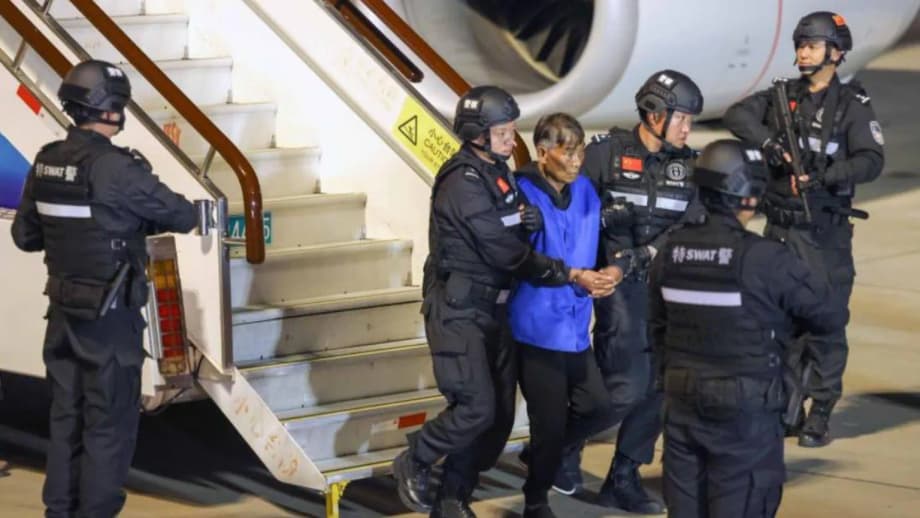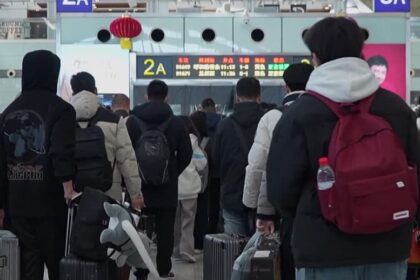Why Beijing moved hard against Kokang crime syndicates
A Chinese court has imposed death sentences on five leaders of the Bai family, a Myanmar based syndicate that for years turned the border city of Laukkaing into a base for casinos and online fraud. The Shenzhen Intermediate People’s Court convicted a total of 21 defendants linked to the network on charges that include fraud, intentional homicide, intentional injury, organizing prostitution, and organizing illegal border crossings. The court named the patriarch, Bai Suocheng, and his son, Bai Yingcang, among those condemned to death, along with Yang Liqiang, Hu Xiaojiang, and Chen Guangyi.
- Why Beijing moved hard against Kokang crime syndicates
- Who are the Bai family and how did they gain power
- Inside the scam machine: from casinos to cyber fraud
- The court decisions and what the penalties mean
- A wider campaign also targeted the Ming family
- War, politics, and the border offensive
- Rescues and repatriation across the region
- Are the syndicates on the run or simply moving
- What this means for ordinary people and for China Myanmar relations
- The Bottom Line
Prosecutors described a sprawling enterprise. Authorities say the Bais controlled a militia and built 41 compounds in Myanmar’s Kokang region for casino operations and large scale cyber scams. Investigators valued the criminal activity at more than 29 billion yuan, or about 4.1 billion dollars, and tied it to the deaths of six Chinese citizens as well as one suicide and multiple injuries.
The sentences mark one of the strongest moves yet in Beijing’s campaign against Southeast Asia’s scam industry. The action follows a separate case in which a Chinese court imposed death sentences on members of the Ming family, another Kokang power center accused of running vast fraud and gambling rackets. Together, the cases highlight how criminal syndicates embedded in Myanmar’s conflict zones grew rich while exploiting trafficked workers and foreign victims.
Pressure mounted in 2023 when Chinese police issued warrants for leading figures and border clashes reshaped control in northern Myanmar. After months of diplomacy and security pressure, the Myanmar military transferred several suspects, including Bai Suocheng and Bai Yingcang, to Chinese custody in early 2024.
Who are the Bai family and how did they gain power
For two decades the Bai family stood at the center of Kokang’s gray economy. Kokang is a Chinese speaking enclave in Myanmar’s Shan State that sits along an active trade route. As Myanmar politics shifted in the 2000s, local clans cultivated ties with military figures, including current junta chief Min Aung Hlaing. The Bais leveraged those relationships and their own militia to dominate local business and politics. Laukkaing grew from a remote town into a bustling strip of casinos, guesthouses, and nightlife.
When China tightened controls on gambling and cross border travel, and as conflict and the pandemic disrupted earlier revenue streams, the Bais pivoted to online scams. The family built compounds that mixed office style floors, dormitories, and holding rooms. Their network recruited workers from across the region with false job offers, then forced many into fraud schemes targeting people at home in China and far beyond.
In a state media documentary released in July, Bai Yingcang reflected on the family’s influence at its height.
At that time, our Bai family was the most powerful in both the political and the military circles.
The Bais used firepower and patronage to protect the business. Witness accounts describe how security teams guarded gates, moved workers under armed escort, and coordinated with local leaders who benefited from the cash that flowed through Kokang. That coercive machinery set the stage for the abuse described in later court filings.
Inside the scam machine: from casinos to cyber fraud
Cyberscam centers in Myanmar have operated like regimented factories. Staff are sorted into teams that pretend to be romantic partners, investment advisers, or lottery tipsters. The aim is to create trust, then steer victims into fake trading platforms or illicit crypto wallets and siphon money. Workers are given daily quotas and scripts to use through messaging apps. Those who miss targets face fines, beatings, or confinement.
How the compounds worked
The Bais built 41 compounds that combined living quarters with operation floors. New arrivals surrendered phones and passports. Managers tracked conversations, while guards patrolled corridors and stairwells. Detainees were traded between compounds, a practice that turned human beings into assets in a criminal market. The Shenzhen court said violence was routine, and the heaviest punishments were reserved for attempted escape or disobedience.
A former worker who appeared in the state media documentary described torture inside one of the centers.
Besides being beaten, they yanked out my fingernails with pliers and cut off two of my fingers with a kitchen knife.
Human rights investigators and international agencies say the industry draws in tens of thousands of people through trafficking and coercion. The United Nations has estimated that about 120,000 people may have worked in scam centers inside Myanmar, with another 100,000 trapped in Cambodia. Independent research groups estimate losses from scams across Southeast Asia in the tens of billions of dollars each year.
The court decisions and what the penalties mean
The Shenzhen Intermediate People’s Court sentenced five defendants to death. They are Bai Suocheng, Bai Yingcang, Yang Liqiang, Hu Xiaojiang, and Chen Guangyi. Two other members of the network received death sentences with a reprieve of two years. Five people were sent to prison for life, and nine others received fixed terms ranging from three to twenty years. Judges cited a catalogue of crimes, including telecommunications fraud, intentional homicide and injury, organizing and coercing prostitution, and organizing illegal crossings.
Chinese courts sometimes suspend death sentences for a set period, after which the punishment can be commuted to life imprisonment if the defendant meets conditions that include good behavior. In separate proceedings, Bai Yingcang was also convicted of conspiring to traffic and manufacture about 11 tons of methamphetamine. The court ordered confiscation of assets and fines, and some foreign defendants face deportation after completing prison terms.
A senior Chinese investigator interviewed in the July documentary explained the purpose of the drive against border scam rings.
No matter who you are, where you are, as long as you commit such heinous crimes against the Chinese people, you will pay the price.
The message speaks to two audiences. It addresses domestic anger over financial losses and violent abuse of Chinese citizens, and it signals to foreign partners that Beijing expects cooperation on arrests and extraditions.
A wider campaign also targeted the Ming family
In a related case, a court in Zhejiang province sentenced members and associates of the Ming family to death for running a multi billion dollar enterprise of scams and gambling based in Kokang. Court findings described gunmen who opened fire at a compound in October 2023, killing four people who were being moved under guard. Prosecutors said the group killed others who resisted orders or tried to flee. The family patriarch, Ming Xuechang, died in custody in Myanmar before he could be handed to China, while his son and other relatives were tried in China.
These judgments were shaped by pressure that began in late 2023. Chinese police offered rewards for wanted suspects, and officials publicized repatriations on a scale rarely seen in the region. Authorities say more than 53,000 Chinese suspects and victims connected to northern Myanmar compounds have been returned to China since the crackdown began.
War, politics, and the border offensive
The crackdown unfolded alongside a major shift in the conflict landscape. In October 2023, an alliance of ethnic armies launched Operation 1027 in northeastern Myanmar, targeting military positions and crime hubs near the Chinese border. Analysts say China did not stand in the way of an offensive that weakened the junta and disrupted scam centers that harmed Chinese nationals.
After the offensive, Chinese officials brokered a ceasefire and leaned on all sides, the junta and armed groups alike, to shut down criminal operations and keep border trade moving. Beijing has kept the junta at arm’s length since the 2021 coup. It favors border stability and influence through relationships with provincial authorities and armed actors rather than a political embrace of the regime.
The result is a patchwork of temporary arrangements. China pursues extraditions, tighter policing in adjacent provinces, and pressure on local militias, while avoiding direct responsibility for Myanmar’s internal conflict.
Rescues and repatriation across the region
The focus on Myanmar is part of a wider regional effort. Joint actions by China, Thailand, and Myanmar led to the release of thousands of detainees along the border. Thai officials have staged airlifts for Chinese nationals rescued from scam centers, with one operation moving about 200 people in a single day, and plans to return up to 1,000 people over several days. International estimates put the number of workers in Myanmar scam centers near 120,000 at the peak, with another 100,000 in Cambodia.
Thailand has cut electricity and other supplies to crime hubs and stepped up patrols. The picture remains complicated. Militia groups allied with the Myanmar military, such as the Border Guard Force and the Democratic Karen Benevolent Army, control compounds and profit from protection rackets. Officials say more than 7,000 stranded people in one border town still need processing and safe passage home.
Rangsiman Rome, who chairs the Thai House Committee on National Security, warned that enforcement alone would not stop the business model.
Thailand cannot do it alone. Only through coordinated international efforts can these networks be fully dismantled and prevented from returning.
Screening rescued people is difficult. Many were lured with offers of legitimate work and trafficked across borders. Others were pressed into scams after arriving. Authorities now separate victims from suspected facilitators and try to identify the financiers and fixers who keep the industry alive.
Are the syndicates on the run or simply moving
Evidence from civil society groups and local media inside Myanmar suggests the business has not disappeared. Under heavy pressure near the Chinese border, operators shifted into eastern and southern parts of Shan State, away from the main crossings. Reports point to activity in townships such as Kunhing, Mongpan, Mong Hsu, Mongyai, Laihka, Tangyan, Namhsan, Mongnawng, and Mongping. Recruiters and managers have also made their way to Yangon, where they rent properties and quietly rebuild networks.
The syndicates adapt with speed. Some compounds use satellite internet and solar power to operate in remote valleys. Others specialize in money laundering and training while downstream sites run romance or investment cons at scale. Investigators have documented kidnappings for ransom. Families are told to pay for a relative’s release, and some do so through crypto transfers that are difficult to trace.
Economic distress in Myanmar feeds the cycle. The country lost an estimated 1.6 million jobs in 2021 after the coup, with youth and women hit hardest. Scarce work pushes people toward risky offers, while kickbacks from syndicates tempt local officials and armed groups. Villages near new hubs now see steady inflows of young people from cities, along with Chinese nationals, and some households earn income by renting rooms or selling food to compound workers.
What this means for ordinary people and for China Myanmar relations
For victims and their families, the court rulings will not quickly undo trauma or debt. Survivors speak of beatings, forced isolation, and threats against relatives. Many return home carrying police records or fines, and some face pressure to repay recruiters even after rescue.
For Myanmar’s fractured politics, the cases underscore the power of armed actors and illicit economies in areas where the state is weak. Syndicates flourish where soldiers, militias, and business elites cut deals for protection. Shutting the enterprise requires sustained coordination that reaches far beyond a single border crossing.
For China, the sentencing of the Bai leaders is aimed at deterrence and public reassurance. It also reinforces a strategy that mixes pressure on the junta, engagement with ethnic armed groups, and high tempo policing on the Chinese side of the frontier. The campaign has removed high profile figures and disrupted many compounds, yet gangs continue to relocate and innovate. Long term gains will depend on cooperation among countries, stronger financial tracing, and support for legal livelihoods in places that crime once dominated.
The Bottom Line
- Five leaders of the Bai family syndicate were sentenced to death in Shenzhen, part of a case that convicted 21 defendants tied to Kokang based scam operations.
- Judges found the network ran 41 compounds, committed telecommunications fraud and violent crimes, and caused at least six deaths of Chinese citizens.
- Two defendants received death sentences with a reprieve of two years, five got life terms, and nine others received prison terms of three to twenty years.
- The Bai case follows death sentences against members of the Ming family for similar crimes in Kokang, including a deadly shooting at a compound in October 2023.
- Chinese pressure on Myanmar led to the handover of wanted suspects in early 2024 and coincided with an ethnic offensive that disrupted border crime hubs.
- Authorities say more than 53,000 people connected to the scam centers in northern Myanmar have been repatriated to China since the crackdown began.
- Rescue operations continue along the Thai Myanmar frontier, with airlifts of Chinese nationals and thousands still awaiting processing and return.
- Operators are relocating deeper inside Myanmar, using satellite connectivity and remote sites, and diversifying into money laundering and ransom schemes.
- Sustained progress depends on cross border cooperation, financial tracking, and support for lawful local economies in areas once dominated by crime.












